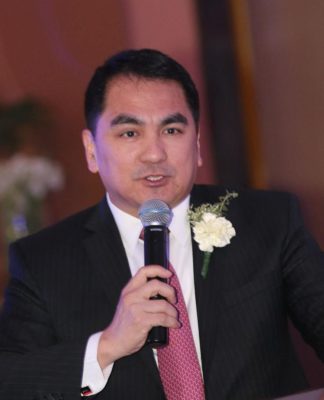MOST people perceive cancer as an inescapable predicament almost synonymous to a death sentence.
But sheer optimism helped this human rights advocate and journalist survive a 13-year-long affair with this deadly malady that has killed millions.
Thomasian and former Varsitarian staffer Edgardo "Ed" Lucas Santoalla lost the fight of his life last Nov. 1 when he succumbed to leukemia or cancer of the blood. He was at 52.
If there was one thing that could distinguish him from others suffering from the same disease, it was that he never lay flat on his back and waited for his time to come.
"He never stopped living," his wife and life companion, Annie Calma-Santoalla, 47, said.
Meeting the sickness
Two years after Ed graduated in 1979 with an Economics degree at the University, he met Annie in a human rights organization called Ecumenical Movement for Justice and Peace.
Ed worked as a writer, while Annie started out as a volunteer who worked at the campaigns of the organization. Their friendship as co-workers eventually blossomed until the couple decided to tie the knot in 1985.
From there, Ed continued to be an advocate of different social issues, mostly concerned with human rights, and joined other non-government groups. After some time, he shifted to journalism and wrote for news publications Malaya and the defunct Manila Chronicle.
In 1998, Ed was diagnosed with leukemia.
"They discovered it at a very early stage. The kids knew," Annie, who has two daughters with Ed, said.
Given the ordeal, the couple knew they had to take immediate action.
"The questions we had that time were—'What are we going to do about it?' instead of 'What is going to happen?'—and wait for it to happen," Annie recalled.
From getting mainstream medical viewpoints to finding out alternative treatments, Ed and Annie soon acquainted themselves with protocols a cancer patient usually undergoes.
Despite learning about the sickness, the family kept their customary lifestyle, but tossed in a few regulations regarding diet and the places they visited. They were careful not to expose him to things that could aggravate his condition.
"We lived with each other as normal as possible. We treated Ed as any other normal person," the widow said, adding that her husband used to remind her that sickness did not necessarily mean misery.
Supportive friends
Annie said her husband's condition was not that bad during its early years, that if one would see Ed, one would not think he was suffering.
"He did not look sick at all until 2008. That was the first time he had to go through a blood transfusion," Annie said.
With the support of their families and friends, Ed's small family was able to get by emotionally and financially.
In spite of the expensive medicine and treatments they needed to cope with the disease, their friends provided invaluable help
"Ed had friends from all sorts; from artists to journalists, to personal and longtime friends in Davao where he grew up. He kept all of them," Annie said. "That was how we managed the challenge; with the help of our family and friends."
Annie described her husband as a very intelligent man with diverse interests. "He is diversity personified," Annie said.
Ed took pleasure in food, music, books, and travelling and was very passionate about life. His love for the outdoors showed when he became a producer and writer for a travel channel.
"He was not really bedridden," Annie said. "If he was in the hospital, he would bring his work to the hospital."
During that time, Ed was already working full-time in Oxfam, a non-government organization that aims to alleviate, if not totally eradicate, poverty and suffering in the country. He also wrote and contributed regularly for newspaper dailies.
In the face of an aggravating sickness and after his contract with Oxfam expired in March this year, he still continued to take on writing jobs and research work.
"He is not somebody who is going to stop working," his wife said.
End game
On October 31, Ed and his family travelled to Bulacan to visit his father for undas. Ed went to the hospital for his regular blood transfusion sessions the day before that.
Ed was fine the whole day until he had the attack that Monday evening.
"We all thought it was just post-transfusion effects, which was usual for him, like nausea, fever, and others," Annie recalled.
His family brought him to the hospital immediately but he expired the following day.
"At a certain time between 10 a.m. and 11 a.m., we knew it was end game and I had to give him up," Annie said, almost tearing up.
"For almost 26 years, he has been part of your daily routine. I knew it was not going to be easy."
In Annie's tribute to her husband during the funeral, she said Ed has left his family and friends so many good memories, enough to last a lifetime remembering him.
She advised people who have lost their loved ones to always remember the good things and honor them everyday by following the good deeds they have displayed when they were still alive.
"It is not the end of everything. It is just the physical body that left. But the essential Ed is always with us-his values, beliefs, and principles. His laughter is still with us," Annie said.
















